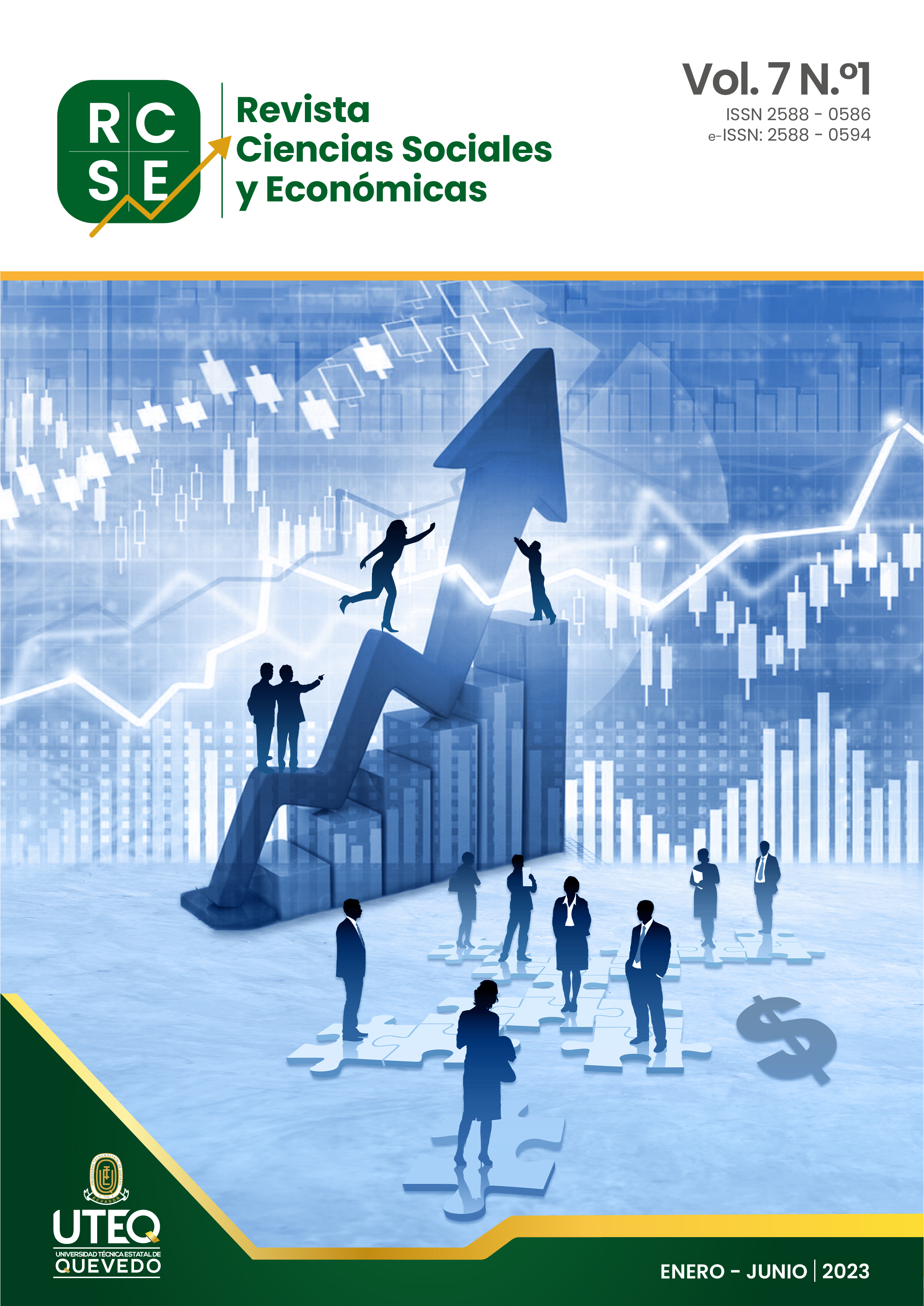Effects of postpandemic tourism on the economic income of the hotel sector of the beach playa
DOI:
https://doi.org/10.18779/csye.v7i1.638Keywords:
postpandemic tourism, beach resort, effects, EcuadorAbstract
The Playas canton is historically considered one of the sun and beach tourism destinations within the Guayas province, the Ministry of Tourism together with the Decentralized Autonomous Government and the cantonal Emergency Operations Center (COE) at the beginning of the year 2021 partially lifted the sanitary restrictions that governed the Playas spa, it must be established whether the purposes for which the new measures were formulated were fulfilled, in view of this problem we propose as a research objective, to determine the economic impact of post-pandemic tourism on Hotels of the beach resort. In the development of this work, the mixed approach was used, the scope is descriptive and the design was non-experimental, cross-sectional, the data collection technique was the survey, the main results of the research on economic income indicate that it is evident a significant level of affectation according to the data of the Ministry of Tourism and the opinion of the respondents, which fluctuates in 26% of hotels closed at the canton level, the establishments with a highly significant affectation are those of the 3-star category, it is also appreciated that the sector is recovering, although it has not reached the production levels of 2019.
Downloads
References
Alava, G. (2017). Estructuración del inventario de atractivos turísticos del cantón el empalme como estrategia para la información de los turistas, año 2017. Obtenido de http://repositorio.ug.edu.ec/bitstream/redug/25292/1/TESIS%20TURISMO%20GENESIS%20ALAVA%202017-2018.pdf
Capece. (1997). Turismo Sostenible y sustentable, una visión holística. Edición CID. Buenos Aires: Argentina.
Capece, & Gustavo. (1997). Turismo Sostenible y sustentable, una visión holística. Edición CID. Buenos Aires: Argentina. Recuperado el 14 de 03 de 2022
Cardoso, C. (2006). Turismo Sostenible: una revisión conceptual aplicada. El Periplo Sustentable(11), 5-21. Recuperado el 14 de 03 de 2022
CEPAL. (2020 b). Enfrentar los efectos cada vez mayores del COVID-19 para una reactivación con igualdad: Nuevas proyecciones. Naciones Unidas. Obtenido de https://www.cepal.org/es/publicaciones/45782-enfrentar-efectos-cada-vez-mayores-covid-19-reactivacion-igualdad-nuevas
CEPAL, C. E. (2020 a). Dimensionar los efectos del COVID-19 para pensar en la reactivación. Naciones Unidas. Obtenido de https://repositorio.cepal.org/bitstream/handle/11362/45445/4/S2000286_es.pdf
CEPAL, C. E. (2020 d). Dimensionar los efectos del COVID-19 para pensar en la reactivación. Naciones Unidas. Obtenido de https://repositorio.cepal.org/bitstream/handle/11362/45445/4/S2000286_es.pdf
COE CANTONAL PLAYAS. (2021). RESOLUCION 005-2021 COE CANTONAL PLAYAS. PLAYAS: GAD DE PLAYAS.
Comisión Económica para América Latina y el Caribe – CEPAL. (2020). Informes COVID-19. Medidas de recuperación del sector turístico en América Latina y el Caribe: Una oportunidad para promover la sostenibilidad y la resiliencia. Naciones Unidas. Obtenido de https://repositorio.cepal.org/bitstream/handle/11362/45770/1/S2000441_es.pdf
DISEÑO DEL PLAN ESTRATÉGICO DE DESARROLLO DE TURISMO SOSTENIBLE PARA ECUADOR PLANDETUR 2020”. (2020). DISEÑO DEL PLAN ESTRATÉGICO DE DESARROLLO DE TURISMO SOSTENIBLE PARA ECUADOR PLANDETUR 2020”. Quito: Tourism & Leisure. Recuperado el 12 de 01 de 2022, de https://www.turismo.gob.ec/wp-content/uploads/downloads/2013/02/PLANDETUR-2020.pdf
Lopez, I., Arriaga, A., & Pardo, M. (2018). La dimensión social del concepto de desarrollo sostenible: ¿La eterna olvidada? 27(1), 41. doi:https://doi.org//10.22325/fes/res.2018.2
Ministerio de Turismo. (26 de Mayo de 2020). Gobierno del Encuentro. Recuperado el 01 de 12 de 2021, de Gobierno del Encuentro: https://www.turismo.gob.ec/ministerio-de-turismo-presenta-su-programa-reactivate-turismo/
Ministerio de Turismo. (2020). Reactívate Turismo. Quito: ministerio del turismo. Recuperado el 01 de 12 de 2021, de https://www.turismo.gob.ec/ministerio-de-turismo-presenta-su-programa-reactivate-turismo/
MINTUR, M. d. (2020). Comportamiento del turismo a nivel nacional dado la nueva normalidad generada por la afectación del virus covid-19. Ecuador. MINTUR.
OMT. (2018). Desarrollo sostenible. Recuperado el 14 de 03 de 2022, de Desarrollo Sostenible: https://www.unwto.org/es/desarrollo-sostenible
OMT. (2021). Turismo responsable, sostenible y accesible. Madrid: World Tourism Organization. Recuperado el 12 de 01 de 2022, de https://www.unwto.org/es/acerca-de-la-omt
Organización Mundial del Turismo. (2021). Turismo responsable, sostenible y accesible. Madrid: World Tourism Organization. Recuperado el 12 de 01 de 2022, de https://www.unwto.org/es/acerca-de-la-omt
Oviedo, M., & Olivo, F. (2021). Tendencias del turismo post covid-19. Una reflexión para Ecuador. Serie Territorios en Debate - Segunda Etapa - Nº 14, 54.
PLAN DE DESARROLLO Y ORDENAMIENTO TERRITORIAL DEL CANTÓN PLAYAS. (2020). PLAN DE DESARROLLO Y ORDENAMIENTO TERRITORIAL DEL CANTÓN PLAYAS. General Villamil Playas: GOBIERNO AUTÓNOMO DESCENTRALIZADO DEL CANTÓN PLAYAS. Recuperado el 12 de 01 de 2022
PLANDETUR. (2020). DISEÑO DEL PLAN ESTRATÉGICO DE DESARROLLO DE TURISMO SOSTENIBLE PARA ECUADOR PLANDETUR 2020”. Quito: Tourism & Leisure. Recuperado el 12 de 01 de 2022, de https://www.turismo.gob.ec/wp-content/uploads/downloads/2013/02/PLANDETUR-2020.pdf
Roa, S. (2021). “El impacto de un Ecuador sin turistas”. GK, 7 de marzo,. Obtenido de https://gk.city/2021/03/07/pandemia-turismo-ecuador/
Santamaría, E., & Bayas, F. M. (2018). EFECTO ECONÓMICO DE LA ACTIVIDAD TURÍSTICA EN LA PROVINCIA DE TUNGURAHUA, ECUADOR. 1(11). doi:ISSN: 2314-3738
Published
How to Cite
Issue
Section
License
Copyright (c) 2023 Jorge Edison Meza Clark, Teresa Meza Clark, German Anibal Narvaez Vasquez

This work is licensed under a Creative Commons Attribution-NonCommercial-ShareAlike 4.0 International License.
Licensing Agreement
This journal provides free access to its content through its website following the principle that making research available free of charge to the public supports a larger exchange of global knowledge.
Web content of the journal is distributed under a Attribution-NonCommercial-ShareAlike 4.0 International.
Authors may adopt other non-exclusive license agreements for the distribution of the version of the published work, provided that the initial publication in this journal is indicated. Authors are allowed and recommended to disseminate their work through the internet before and during the submission process, which can produce interesting exchanges and increase citations of the published work.






